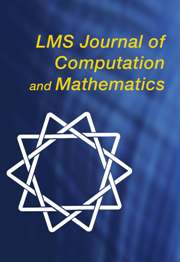Article contents
Roots of sparse polynomials over a finite field
Published online by Cambridge University Press: 26 August 2016
Abstract
For a  $t$ -nomial
$t$ -nomial  $f(x)=\sum _{i=1}^{t}c_{i}x^{a_{i}}\in \mathbb{F}_{q}[x]$ , we show that the number of distinct, nonzero roots of
$f(x)=\sum _{i=1}^{t}c_{i}x^{a_{i}}\in \mathbb{F}_{q}[x]$ , we show that the number of distinct, nonzero roots of  $f$ is bounded above by
$f$ is bounded above by  $2(q-1)^{1-\unicode[STIX]{x1D700}}C^{\unicode[STIX]{x1D700}}$ , where
$2(q-1)^{1-\unicode[STIX]{x1D700}}C^{\unicode[STIX]{x1D700}}$ , where  $\unicode[STIX]{x1D700}=1/(t-1)$ and
$\unicode[STIX]{x1D700}=1/(t-1)$ and  $C$ is the size of the largest coset in
$C$ is the size of the largest coset in  $\mathbb{F}_{q}^{\ast }$ on which
$\mathbb{F}_{q}^{\ast }$ on which  $f$ vanishes completely. Additionally, we describe a number-theoretic parameter depending only on
$f$ vanishes completely. Additionally, we describe a number-theoretic parameter depending only on  $q$ and the exponents
$q$ and the exponents  $a_{i}$ which provides a general and easily computable upper bound for
$a_{i}$ which provides a general and easily computable upper bound for  $C$ . We thus obtain a strict improvement over an earlier bound of Canetti et al. which is related to the uniformity of the Diffie–Hellman distribution. Finally, we conjecture that
$C$ . We thus obtain a strict improvement over an earlier bound of Canetti et al. which is related to the uniformity of the Diffie–Hellman distribution. Finally, we conjecture that  $t$ -nomials over prime fields have only
$t$ -nomials over prime fields have only  $O(t\log p)$ roots in
$O(t\log p)$ roots in  $\mathbb{F}_{p}^{\ast }$ when
$\mathbb{F}_{p}^{\ast }$ when  $C=1$ .
$C=1$ .
MSC classification
Information
- Type
- Research Article
- Information
- LMS Journal of Computation and Mathematics , Volume 19 , Special Issue A: Algorithmic Number Theory Symposium XII , 2016 , pp. 196 - 204
- Copyright
- © The Author 2016
References
- 7
- Cited by

